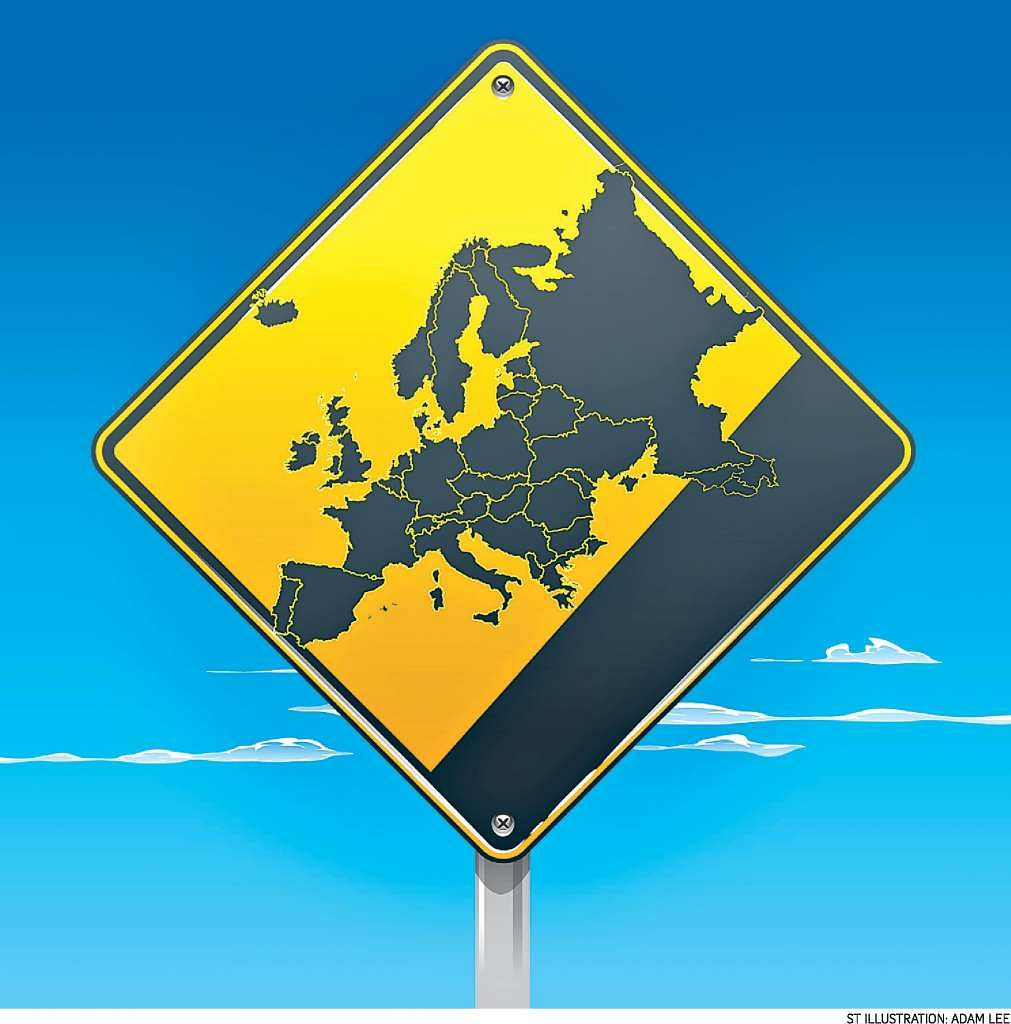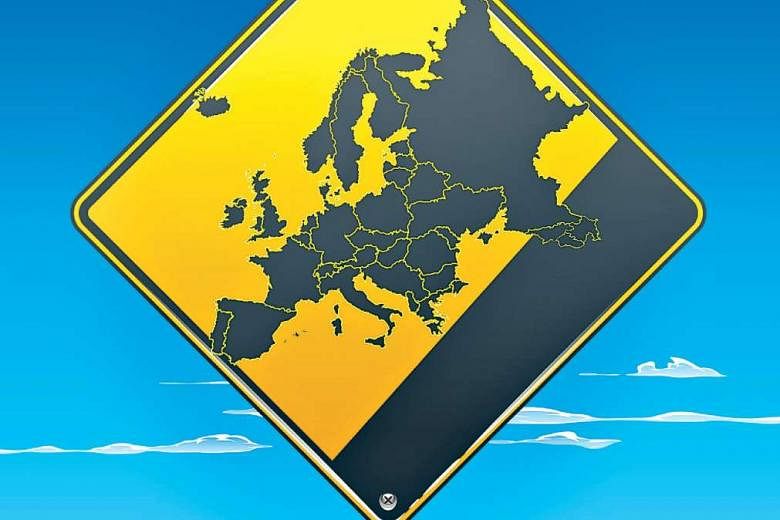My generation of Western Europeans (born 1945) is the luckiest.
We stand in stark contrast to our fathers and grandfathers, and I fear, ultimately, in contrast to prospects for our children and grandchildren.
The power of Europe over the rest of the planet reached its apogee in 1900 and, even in 1913, "a European could survey the world in 1913 as the Greek gods might have surveyed it from the snowy heights of Mount Olympus: themselves above, the teeming earth below". Those were the words of Charles Emmerson in his excellent book, 1913: The World Before The Great War.
But, two points. First, while the European elites were doing splendidly well, the vast majority of Europeans still constituted the proverbial downtrodden masses. Factory conditions, for example, were "Dickensian". Second, this apparent glory was ravaged by two devastating wars in quick succession, several civil wars (my mother was a refugee from the Spanish civil war), revolutions, insurrections, pandemics (the Spanish influenza of 1918), economic depression, widespread unemployment, the rise of extremist political doctrines and regimes (notably communism, fascism and nazism), genocide, ultra-nationalism, and we could go distressingly on.
By 1945, the war was over, but by no means could one presume that peace and prosperity would be restored. Yet, that is precisely what happened.
In the ensuing decades, things got better and better and better. To paraphrase the words of the late British prime minister Harold Macmillan in a 1957 campaign speech, "we'd never had it so good".

There were blips along the way, including some European home-grown terrorism - the Baader-Meinhof Gang in Germany, the Brigate Rosse in Italy, in the 1970s - and the recession and high inflation following the Opec "crisis" of 1973. In essence, however, with each passing decade things got better in every respect.
The "liberation" of women made some significant achievements, especially in the 1960s. I did my doctorate (1967 to 1970) at the first college (St Antony's) at Oxford to become co-educational (and met my wife there).
In Western Europe, democracy spread in the 1970s to include Spain, Portugal and Greece, as extremist ideologies and totalitarian regimes receded and fell. Europe opened up considerably on all fronts, including much freer travel across borders.
Through such initiatives as the Erasmus exchange programme, students from different Western European nationalities could mingle and exchange views and knowledge. Perhaps most fundamental of all, while obviously not perfect, Western European countries achieved far greater justice, including in the provision of healthcare to all.
For its part, what was initially called the European Economic Community, then the European Community (EC), expanded membership from the original six (Belgium, France, Germany, Italy, Luxembourg and the Netherlands) to include Denmark, Ireland and the UK (1973), Greece (1981), Spain and Portugal (1986), then Austria, Sweden and Finland (1995). The model of an economically, politically, socially and intellectually open Western Europe stood in such stark contrast to the closed and stultifying Eastern Europe that, in 1989, the Berlin Wall came forcibly tumbling down.
The progress and building of the European Union or EU (as it became in Maastricht in 1993) seemed to continue unabated. In 1999, the euro was introduced and circulated from 2002. In 2004, 10 new countries became members - eight of them (the other two Cyprus and Malta) formerly part of the Soviet Empire: Czech Republic, Estonia, Hungary, Latvia, Lithuania, Poland, Slovakia and Slovenia (Bulgaria and Romania followed in 2007, and Croatia in 2013). Then in 2005, the Schengen agreement of free movement of people across European borders was implemented.
The year 2005 marked the peak of the European project. It hovered for about five years. Since 2010, it has been in decline. By last year, questions were being asked whether the EU might not, in fact, be in decay.
In 2014, no less a figure than the much-respected former German foreign minister Joschka Fischer published a book titled, Is Europe Failing? In it, he describes a dangerous unravelling of the European project.
Now there is a general tendency to blame the so-called "refugee crisis" for the "EU crisis". In fact, it is a symptom, not a cause. The refugees are seeking to enter an edifice that was already in decrepitude.
The first salvo came in 2005 with the rejection by popular referendum of the proposed European Constitution in two of the EC founding member countries: France and the Netherlands.
The document in many ways illustrated what was going terribly wrong in the EU. It was composed of 70,000 words written in an impenetrable language. (I tried reading it, gave up.)
The architects of Europe - people such as Jean Monnet, Maurice Schumann and the political leaders respectively of Germany and France, Konrad Adenauer and Charles de Gaulle - were visionary intellectual giants. The recent and current European leaders meant to execute the project are, with very few exceptions, myopic intellectual pygmies. Brussels lives in a distant cloud.
While Brussels talks of monetary union, political union, possible fiscal and banking union, the most glaring gap which it fails to see is that there is no emotional union.
Europe was, and has, to remain a dream. The ideal was not nurtured. My generation of Europeans know how much we owe to the construction of the European project. However, unless adapted and rejuvenated, the dream was bound to become stale with the following generations.
Instead, there have been a series of nightmares: the euro crisis; the threats of Greece being ejected from the Union (Grexit) and Britain leaving (Brexit); the rise of populist politics virtually everywhere; but most notably, worrying political trends in Hungary and Poland; the spectre of a more offensive Russia; the inability of the EU to contribute meaningfully to the crises in the Middle East; the clear signs of the collapse of the Schengen free movement deal; and now, the immigration/refugee challenge.
So what are the prospects?
Based on current trends, they are bleak.
There will be no European war as in 1914 to 1918 or 1939 to 1945. That is the proverbial good news.
It is also highly unlikely that there will be a return to extremist politics; there will be no 21st-century versions of Hitler or Mussolini. Democracies will weaken, but will prevail, though in an increasingly illiberal atmosphere.
The much ballyhooed so-European values of tolerance, fairness, openness, etc, will erode. Border controls will be reimposed, as Schengen will be buried.
With ageing populations, rising unemployment and growing crime rates, the social climate will deteriorate significantly, as will the economies and business prospects.
Asians will have to adapt their policies, strategies and attitudes to this ageing, closing, inward-looking, somewhat xenophobic, declining European reality.
This is a pessimistic, indeed alarmist, perspective. However, it is much better to be pessimistic and alarmist and be proved wrong, than to be complacently optimistic - as most Europeans were in 1913 - and to be proved wrong.
I also insist that what I am describing is based on current trends. Trends can be, and often have been, reversed.
However, they are unlikely to be reversed simply by wishful thinking.
The urgent imperative is to combat the forces of disintegration and, most fundamentally, to create trans-EU emotional bonds through the rejuvenation of the European dream.
- The writer is emeritus professor of international political economy at IMD, Lausanne, Switzerland, and visiting professor at Hong Kong University. He is founder of The Evian Group, which promotes the development of open, sustainable, global market economies within a rules-based multilateral framework.


